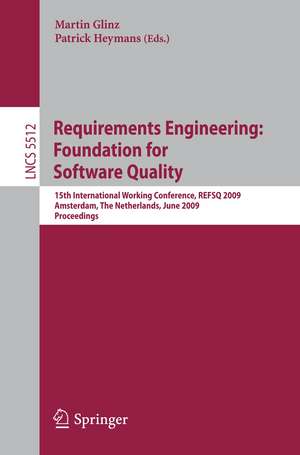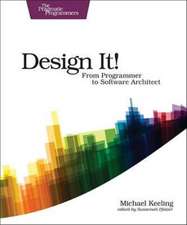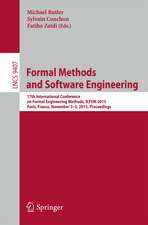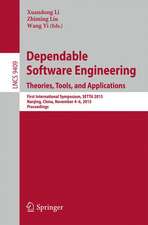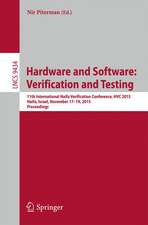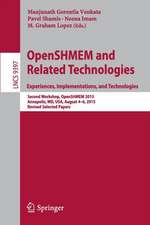Requirements Engineering: Foundation for Software Quality: 15th International Working Conference, REFSQ 2009 Amsterdam, The Netherlands, June 8-9, 2009 Proceedings: Lecture Notes in Computer Science, cartea 5512
Editat de Martin Glinz, Patrick Heymansen Limba Engleză Paperback – 27 mai 2009
Din seria Lecture Notes in Computer Science
- 20%
 Preț: 1061.55 lei
Preț: 1061.55 lei - 20%
 Preț: 307.71 lei
Preț: 307.71 lei - 20%
 Preț: 438.69 lei
Preț: 438.69 lei - 20%
 Preț: 645.28 lei
Preț: 645.28 lei -
 Preț: 410.88 lei
Preț: 410.88 lei - 15%
 Preț: 580.46 lei
Preț: 580.46 lei - 17%
 Preț: 427.22 lei
Preț: 427.22 lei - 20%
 Preț: 596.46 lei
Preț: 596.46 lei -
 Preț: 381.21 lei
Preț: 381.21 lei - 20%
 Preț: 353.50 lei
Preț: 353.50 lei - 20%
 Preț: 1414.79 lei
Preț: 1414.79 lei - 20%
 Preț: 309.90 lei
Preț: 309.90 lei - 20%
 Preț: 583.40 lei
Preț: 583.40 lei - 20%
 Preț: 1075.26 lei
Preț: 1075.26 lei - 20%
 Preț: 310.26 lei
Preț: 310.26 lei - 20%
 Preț: 655.02 lei
Preț: 655.02 lei - 20%
 Preț: 580.93 lei
Preț: 580.93 lei - 20%
 Preț: 340.32 lei
Preț: 340.32 lei - 15%
 Preț: 438.59 lei
Preț: 438.59 lei - 20%
 Preț: 591.51 lei
Preț: 591.51 lei - 20%
 Preț: 649.49 lei
Preț: 649.49 lei - 20%
 Preț: 337.00 lei
Preț: 337.00 lei -
 Preț: 449.57 lei
Preț: 449.57 lei - 20%
 Preț: 607.39 lei
Preț: 607.39 lei - 20%
 Preț: 1024.44 lei
Preț: 1024.44 lei - 20%
 Preț: 579.30 lei
Preț: 579.30 lei - 20%
 Preț: 763.23 lei
Preț: 763.23 lei - 20%
 Preț: 453.32 lei
Preț: 453.32 lei - 20%
 Preț: 575.48 lei
Preț: 575.48 lei - 20%
 Preț: 585.88 lei
Preț: 585.88 lei - 20%
 Preț: 825.93 lei
Preț: 825.93 lei - 20%
 Preț: 763.23 lei
Preț: 763.23 lei - 17%
 Preț: 360.19 lei
Preț: 360.19 lei - 20%
 Preț: 1183.14 lei
Preț: 1183.14 lei - 20%
 Preț: 340.32 lei
Preț: 340.32 lei - 20%
 Preț: 504.57 lei
Preț: 504.57 lei - 20%
 Preț: 369.12 lei
Preț: 369.12 lei - 20%
 Preț: 583.40 lei
Preț: 583.40 lei - 20%
 Preț: 343.62 lei
Preț: 343.62 lei - 20%
 Preț: 350.21 lei
Preț: 350.21 lei - 20%
 Preț: 764.89 lei
Preț: 764.89 lei - 20%
 Preț: 583.40 lei
Preț: 583.40 lei -
 Preț: 389.48 lei
Preț: 389.48 lei - 20%
 Preț: 341.95 lei
Preț: 341.95 lei - 20%
 Preț: 238.01 lei
Preț: 238.01 lei - 20%
 Preț: 538.29 lei
Preț: 538.29 lei
Preț: 333.72 lei
Preț vechi: 417.15 lei
-20% Nou
Puncte Express: 501
Preț estimativ în valută:
63.86€ • 66.27$ • 53.38£
63.86€ • 66.27$ • 53.38£
Carte tipărită la comandă
Livrare economică 17-31 martie
Preluare comenzi: 021 569.72.76
Specificații
ISBN-13: 9783642020490
ISBN-10: 3642020496
Pagini: 272
Ilustrații: XIII, 257 p.
Dimensiuni: 155 x 235 x 14 mm
Greutate: 0.45 kg
Ediția:2009
Editura: Springer Berlin, Heidelberg
Colecția Springer
Seriile Lecture Notes in Computer Science, Programming and Software Engineering
Locul publicării:Berlin, Heidelberg, Germany
ISBN-10: 3642020496
Pagini: 272
Ilustrații: XIII, 257 p.
Dimensiuni: 155 x 235 x 14 mm
Greutate: 0.45 kg
Ediția:2009
Editura: Springer Berlin, Heidelberg
Colecția Springer
Seriile Lecture Notes in Computer Science, Programming and Software Engineering
Locul publicării:Berlin, Heidelberg, Germany
Public țintă
ResearchCuprins
Value and Risk.- When Product Managers Gamble with Requirements: Attitudes to Value and Risk.- Toward a Service Management Quality Model.- A Controlled Experiment of a Method for Early Requirements Triage Utilizing Product Strategies.- Demystifying Release Definition: From Requirements Prioritization to Collaborative Value Quantification.- Change and Evolution.- Specifying Changes Only – A Case Study on Delta Requirements.- Requirements Tracing to Support Change in Dynamically Adaptive Systems.- Interactions and Inconsistencies.- Early Identification of Problem Interactions: A Tool-Supported Approach.- Composing Models for Detecting Inconsistencies: A Requirements Engineering Perspective.- Organization and Structuring.- Experiences with a Requirements Object Model.- Architecting and Coordinating Thousands of Requirements – An Industrial Case Study.- Experience.- BPMN-Based Specification of Task Descriptions: Approach and Lessons Learnt.- Clarifying Non-functional Requirements to Improve User Acceptance – Experience at Siemens.- Elicitation.- Scenarios in the Wild: Experiences with a Contextual Requirements Discovery Method.- Inventing Requirements with Creativity Support Tools.- Research Methods.- A Quantitative Assessment of Requirements Engineering Publications – 1963-2008.- Assurance Case Driven Case Study Design for Requirements Engineering Research.- Behavior Modeling.- Translation of Textual Specifications to Automata by Means of Discourse Context Modeling.- A Requirements Reference Model for Model-Based Requirements Engineering in the Automotive Domain.- Empirical Studies.- Quality Requirements in Practice: An Interview Study in Requirements Engineering for Embedded Systems.- Does Requirements Clustering Lead to Modular Design?.- Open-Source RE.- LessonsLearned from Open Source Projects for Facilitating Online Requirements Processes.
Textul de pe ultima copertă
This book constitutes the refereed proceedings of the 15th International Working Conference on Requirements Engineering: Foundation for Software Quality, REFSQ 2009, held in Amsterdam, The Netherlands, in June 2009.
The 14 revised full papers were carefully reviewed and selected from 49 submissions. The papers are organized in thematic sections on value and risk, change and evolution, interactions and inconsistencies, organization and structuring, experience, elicitation, research methods, behavior modeling, empirical studies, and open-source RE.
The 14 revised full papers were carefully reviewed and selected from 49 submissions. The papers are organized in thematic sections on value and risk, change and evolution, interactions and inconsistencies, organization and structuring, experience, elicitation, research methods, behavior modeling, empirical studies, and open-source RE.
